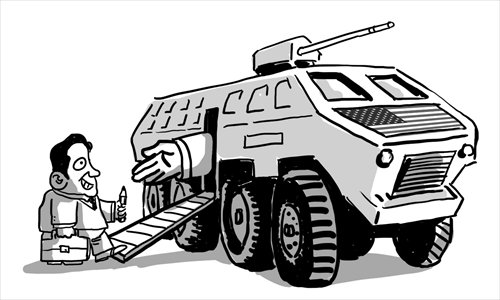HOME >> OP-ED
Arms trade gives Tokyo more clout with US
By Ding Gang Source:Global Times Published: 2014-4-9 22:38:09

Illustration: Liu Rui/GT
Japan has adopted new "three principles" on arms exports, eschewing the previous long-standing ban on exports. The new principles are partially because of considerations against China. But this is not Tokyo's primary goal.
There are more profound calculations behind Japan's approval of new rules on the transfer of defense equipment.
What Tokyo seeks is to gradually and fundamentally move away from US control while still maintaining cooperation with Washington, thus becoming a dominant force in Asia.
It is the upcoming change in Japan-US cooperation on military technology that serves as the most influential element in Asia's future geometry.
Washington has hailed Japan's relaxation of arms exports. "We believe this is a good step. We welcome this step," US State Department spokeswoman Marie Harf said, depicting Japan's new policy as one that would facilitate US-Japan defense industry cooperation.
Washington has long craved for a Japan that is able to jointly develop arms with the US more openly.
Superficially, Japan's current arms exports is still under the sway of the US, and its development of weapons and arms technologies largely matches that of the US.
As global defense equipment market has been basically divided up, it is difficult for Japan to enter the marketplace independently and take a substantial share of the global arms trade.
However, in the long term, Japan has huge potential in arms development if it joins hands with Washington.
In fact, Japan's strong advantages in electronic technology have been long valued by the US military. In recent years, the two countries have collaborated closely in developing a wide range of military equipment.
Not long ago, Japan got permission from the US to design its own version of a littoral combat ship, which can hold two MH-60 Seahawk helicopters, with US assistance.
In 2013, Japan's IHI Corporation signed a contract with Pratt & Whitney to work together on military engines for the fifth generation F-35 Lightning II fighter aircraft.
It is likely that more Japanese products will be used in US military hardware, and more US technologies in Japan's defense equipment.
Such cooperation benefits the two both technologically and economically.
Moreover, as soon as wide cooperation in technology kicks off, other communication activities, including information exchange, staff training and even strategic complementarity and collaboration, will be easier to be implemented as both sides will have a strong history of cooperation to build on.
This will undoubtedly improve the abilities of both US military and Japan's Self-Defense Forces.
Mutual trust will thus be enhanced, which ensures deeper strategic cooperation.
Military cooperation has been a key point in judging bilateral relationships. Economic and cultural cooperation helps consolidate bilateral relations, but without military cooperation, the mutual trust between two countries, especially two major powers, is likely absent.
This is why the US and Europe still set strict restrictions on arms exports to China.
Deepening strategic complementarity will further consolidate US-Japan interdependence, which will make a closer alliance.
When that happens, will the military frictions between China and Japan automatically become Sino-US frictions?
US-Japan cooperation on military technology will ultimately influence Washington's ability to restrain Tokyo.
The constantly upgrading military technologies will not necessarily lead to conflicts or even wars, but the integration of military technology will fundamentally change US-Japan relationship.
At the moment, the US maintains considerable clout over Japan. But its sway will gradually decline as military and strategic cooperation between the two countries is increasingly consolidated, and Washington becomes more reliant on Japan in developing defense technology.
Japan's status in its alliance with the US will be greatly raised. With such a basis, Japan will have a different position in Asia.
This, most of all, is what the Abe administration envisages for Japan's comprehensive political and military rise.
The author is a senior editor with People's Daily. He is now stationed in Brazil. dinggang@globaltimes.com.cn. Follow him on Twitter at @dinggangchina
Posted in: Columnists, Ding Gang, Viewpoint